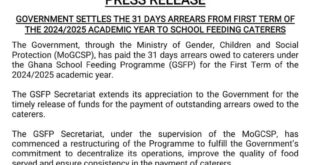Ghana is poised to eliminate malaria deaths by 90 per cent and case incidence by 50 per cent in the year 2028.
This was disclosed in Accra yesterday at the launching of the National Malaria Elimination Strategic Plan 2024 to 2028, on the theme ‘Zero Malaria Starts Now-Launching Ghana’s Path to Elimination.’
The objective of the plan is to ensure that 100 per cent of the population have “adequate knowledge, attitudes, practices and requisite skills for malaria elimination by 2028.”
It would also ensure that 100 per cent of confirmed malaria cases are appropriately, effectively and completely treated by 2028.
The President, Nana Addo Dankwa Akufo-Addo, whose speech was read for him by the Presidential Advisor on Health, Dr Anthony Nsiah-Asare lauded various stakeholders for their contributions towards the development of the National Strategic Plan.
To this end, the President called on relevant stakeholders, both in the private and public sectors to take ownership of the strategies outlined in the strategic document.
Additionally, he urged the stakeholders to work in partnership with the Ministry of Health and the Ghana Health Service towards the full implementation of the planned activities.
The President indicated that he was confident that the sub-national elimination approach adopted would help the country achieve the target of “zero malaria” considering progress made in recent years.
He further assured the government’s commitment in providing the needed resources to support the development and implementation of various strategies and elimination activities.
The Minister of Health, Mr Kwaku Agyeman-Manu, said the government efforts to control malaria in Ghana led to the creation of a malaria control unit within the Ministry of Health (MoH).
“National Malaria Elimination Programme was established to reduce malaria morbidity and mortality rates by 75 per cent by 2020, using 2012 as a baseline,” he said.
Mr Agyeman-Manu said the ministry had made significant progress in reducing the burden of malaria in the last decades, “with smart investments, strong and enduring partnerships, a dedicated workforce and effective leadership, we have reached millions with lifesaving interventions. Malaria-related deaths at all ages reduced from 3889 in 2008 to 155 by the end of 2022 (96 per cent reduction).
He said the under-five malaria case fatality rate also reduced from 1.7 per cent in 2008 to 0.06 per cent in 2022 (a 65 per cent reduction).
According to him, the health services delivery data analysis showed that malaria remained the number one cause of health facility visit in the country in 2022.
Furthermore, he said malaria had consistently constituted more than 20 per cent of all diseases diagnosed at the Out Patient Department, (OPD) from 2018 to 2022.
“Also, available data from the 2022 Holistic Assessment report shows that the Upper East Region recorded the worst malaria incidence of 349.2 per 1,000 population, whilst the Greater Accra Region posted the best of 38.2 per 1,000 population,” he said.
Director-General of the Ghana Health Service, Dr. Patrick Kuma-Aboagye also emphasized that eliminating malaria requires high political will and commitment.
He pointed out that other countries that have successfully kicked out malaria made it a high-priority disease, and he is urging Ghana to adopt a similar approach.
Speaking at the launch of the National Malaria Elimination Strategic Plan in Accra, Dr. Patrick Kuma-Aboagye stressed that this step will ensure Ghana joins the 43 countries that have successfully eliminated malaria.
According to him, “Elimination of malaria as we have learnt from countries that have eliminated it, requires high political will and commitment, maintaining malaria high on political agenda, country ownership, as well as sustained efforts, are required”
He recounted that Cabo Verde is the third African country to be certified by (WHO) as malaria-free, joining Mauritius and Algeria which were certified in 1973 and 2019 respectively
Dr. Patrick Kuma-Aboagye also stated that in order to fast-track the elimination of Malaria in Ghana, the government plans to constitute two committees aside from the already existing committee to drive the elimination agenda.
These are the Independent National Malaria Elimination Oversight Committee (NMEOC) and the National Malaria Elimination Technical Coordination Committee (NMETCC).
He explained that these committees are going to provide advisory and technical support.
The World Health Organisation, Representative, Dr Sharmila Lareef called for political commitment, partnerships and adequate investment in the elimination of the disease.
THANK YOU for constantly reading stories on MyGhanaMedia.com, a news publishing website from Ghana. Kindly like, follow, comment, and SHARE stories on all social media platforms for more entertaining updates!
Follow us on Twitter: https://twitter.com/
Source: MyGhanaMedia.com /Narh Noach osoklono-Accra
There are four types of content published on MyGhanaMedia.com daily: curated content; syndicated content; user-generated content; and original content.
 MYGHANAMEDIA.COM Best Source Of Latest News
MYGHANAMEDIA.COM Best Source Of Latest News





